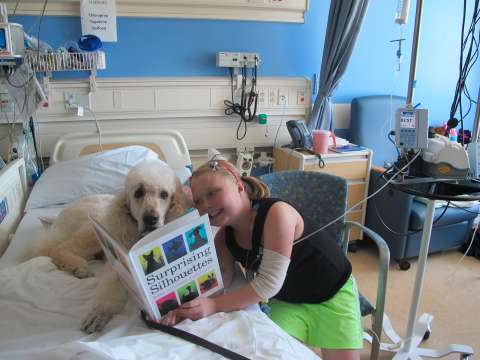PAC Literacy Program
Reading Is the Way Up

The UCLA People-Animal Connection (PAC) program has recently joined forces with City National's Reading is The way up® to provide PAC with books of various levels for many pediatric patients. But this is no ordinary readers' club. In this program, children are given a book to keep and provided the opportunity to read that book to a very special visitor: one of the UCLA PAC therapy dogs. This program seeks to motivate children, who may have been stuck in the hospital for days, weeks or even months, to keep their reading level up during their hospital stay. And what better motivation is there than to read to a furry friend?
One volunteer, Laura Botfeld, and her dog, Apollo, who have been PAC volunteers for over 6 years, are frequent flyers in the literacy program. Laura admitted having reservations when first approached to participate in this program: "I was skeptical at first. I thought having a dog around would make it hard for the kids to concentrate on the reading."
However, after a very special visit with a 6 year old girl, her perspective changed. This little girl had been described by her parents and medical staff as withdrawn and distant during the past few days prior to Apollo and Laura's visit. Again, Laura felt skeptical about what good it would do to ask the girl if she would like to read to Apollo. Nevertheless, she placed Apollo on the foot of the girl's bed and gave her a Doctor Seuss book. The following moments opened everyone's eyes to the powers of a therapy dog. "What was shocking was that the little girl got into it," Laura recalls. "She kept saying 'I want to turn the page'. It may seem like nothing for a healthy person to want to do that, but for her to want to sit up and turn the page, that was a breakthrough according to the father." During this moment, there were tears all around and it made Laura believe that "this is a worthwhile program."
This literacy program does not just provide fun for the children who are able to participate; it is something which Apollo loves as well. "Apollo doesn't want to leave either!" Laura says. "He gets so comfortable with the kids. They are laughing a lot trying to see how hard it is to get Apollo off the bed when it is time to go home." It seems that Apollo knows the comfort that he is providing to these children and their families, making it quite understandable when he doesn't want the moment to end. Spending on average about 10-20 minutes per visit with each child, by the time Apollo gets home from a visit, "...he is exhausted! He just puts out so much energy for these kids while we are there, that it just drains him!"
This literacy program provides a moment in time where a child can get their mind off their illness and the hospital environment, and feel more at home with a dog in their lap and a book in their hand. Laura and Apollo are great examples of the impact many PAC volunteers have on the lives of their patients and the many breakthroughs that happen within the presence of a PAC therapy dog. As Laura reflects on her experiences, she states that "those kinds of healing moments make it all worth it," which surely demonstrates how many PAC volunteers and their therapy dogs must feel on a day to day basis.